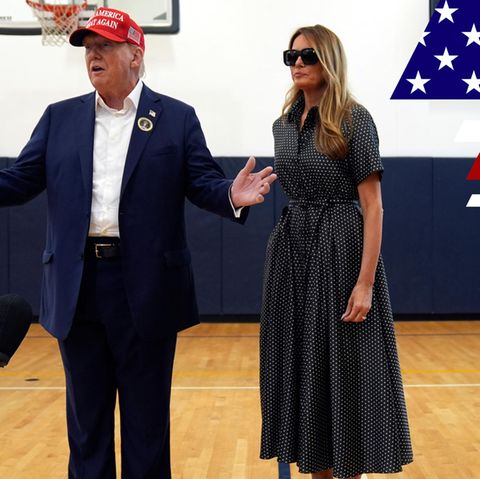populism
How much should Donald Trump cost Friedrich Merz?
Copy the current link
Exaggerations, defamation and fake news: The US election campaign, especially Donald Trump’s rhetoric, was brutal. The severity is also increasing in this country – but there are still limits.
Eat? A popular topic for politicians too. When the European Union approved several species of insects as food in 2023 and Green Party representatives welcomed this, Markus Söder went into attack mode: He preferred roast pork to house crickets or grain mold beetles, said the CSU boss. He complained that the Greens were calling for more and more regulations on eating, which he considered to be “completely excessive.” That was a huge exaggeration, but what does that matter if you want to build up your political opponent as an enemy?
The television duel between Kamala Harris and Donald Trump was also about food, although even tougher: The Republican presidential candidate claimed that Haitian refugees were stealing and eating pets in a Texas border town. That was demonstrably false. But what does it matter when it comes to fueling anti-migrant sentiment?
Will Germany be threatened by American conditions in the future?
Can you really compare Markus Söder and Donald Trump? Of course not. The CSU boss is an unrestrained sharp-talker, the US presidential candidate is a notorious liar. Personal defamation is part of Trump’s daily business; the US election campaign was at times a political horror show. And yet the mixture of exaggerations, half-truths, alternative facts and targeted disinformation is also finding its way into political discourse in Germany. Are we threatened with American conditions in the future?
The political debate in the Federal Republic has always been extremely tough. Personal attacks are also sometimes carried out; its worst form – for obvious reasons a German specificity – is the Nazi comparison. Willy Brandt already used the name Goebbels in connection with Heiner Geißler and Helmut Kohl with regard to Mikhail Gorbachev. Most recently, Saskia Esken and Lars Klingbeil felt compelled to insult the AfD as a Nazi party. And CDU politician Jens Spahn was reminded of Hermann Göring by Bundestag Vice President Aydan Özoğuz because of an anti-Israel post. Markus Söder, possibly looking for new meanness, again thought it appropriate on Ash Wednesday to compare Green Party Minister Steffi Lemke with Margot Honecker. But the Germans are still squeamish. It is not uncommon for such attacks to fall back on the attacker.
The phenomenon of targeted disinformation is also not new. Targeted misleading, or fake news, became the subject of intensive scrutiny only a few years ago, fueled by Donald Trump’s first term as US President, the growing importance of social media and Russian propaganda attacks.
When is a claim a deliberate lie and when is it a mistake?
Fake news, that sounds like a clear definition – but the opposite is the case. The transitions are often fluid. When is a claim a deliberate lie and when is it a mistake? You can be the perpetrator of fake news or you can style yourself as its victim. Or both. False claims are made, but facts are also slandered as false. Donald Trump spreads false information and conversely calls many journalists fake news.
One thing is certain: allegations and accusations that are on the fringes or beyond the truth are also playing an increasingly important role in German politics. The best-known case of fake news to date was the disappearance of the then 13-year-old Russian-German Lisa in Berlin in 2016, which was exploited by Russian Foreign Minister Sergei Lavrov to make massive allegations against German authorities. During the corona pandemic, false reports circulated on social media. During the 2021 election campaign, Annalena Baerbock was often the victim of absurd allegations: the Green Party candidate for chancellor allegedly wanted to ban pets or abolish widows’ pensions, it was said.
Conversely, in September 2023, Friedrich Merz came under fire because he claimed that German patients were no longer getting doctor’s appointments because of rejected asylum seekers in the waiting rooms. And a study has now shown that up to 40 percent of those surveyed believe false statements about wind power: it is a danger to birds, carcinogenic to humans and bad for groundwater.
Compared to the USA, the Germans are still relatively resilient
Fake news has also become a political instrument in Germany. Spreaders of so-called alternative facts have long been committed to wanting to create a kind of reality of their own. What doesn’t fit will be made to fit. When asked why fake news was deliberately shared by the AfD, the party spokesman at the time told the ARD fact finder in 2017: “If the message is true, we don’t really care where the whole thing comes from or how it was created. Then it is Nor is it so tragic that it’s fake.”
What is noteworthy, however, is the question of the political impact of fake news in Germany. Studies have shown that around the 2017 and 2021 federal elections, the debate about alternative facts was more intense than their actual impact on the outcome of the election. The Germans are resilient. Could that change in the next federal election? American conditions are conceivable, but unlikely. To date, protection against fake news in Germany has been provided by a media system whose credibility, despite all the criticism of public broadcasting and the private sector press, is still high – compared to the USA.

Would you like to know everything about the US election?
The starThe local team informs you every Saturday in the free “Inside America” newsletter about the most important developments and provides insights into how Americans really look at their country. Click here to register.
After entering your email address, you will receive an email confirming your registration.
A core of extremely critical people has also emerged in this country who view the media with downright hostility and turn to so-called “alternative” media, says Tanjev Schultz, professor of journalism at the University of Mainz. This group is between 15 and 25 percent, many gathered behind the slogan of the “lying press”, especially supporters of the AfD. “But the majority in Germany still consider the established media and media brands to be largely credible,” says Schultz.
US media reflects political polarization
A good two thirds still considered the often hostile public broadcaster to be trustworthy. In the USA, on the other hand, there is now a lack of sources that a majority of citizens can rely on as a basis for reliable information, said Schultz. Many people have lost trust in the news media over the past few decades. “The major news channels, but also many newspapers there, are considered partisan and reflect the political polarization.”
In addition, in Germany the structure of the political system itself contributes to its own protection. Unlike in the USA, where majority voting has led to massive polarization, proportional representation in Germany promotes broader parliamentary representation. And the requirement to form coalition governments promotes the ability to reach consensus.
However, this willingness to compromise can come under pressure when things get tough in distribution conflicts. The pronounced consensus democracy and the pragmatic crisis management of the past few years mean that today we “experience the return to an era of conflict democracy as abrupt and painful,” noted historian Martin Sabrow at the beginning of 2024, when farmers mobilized against the cut in agricultural diesel and also used politicians’ puppets dangling from the gallows.
Users recognize Donald Trump as a Matrix figure as satire
In such a mood, alternative facts are becoming increasingly widespread. Their effectiveness depends not only on the creativity of their creators, but also on the gullibility of the recipients. Experiences from the USA show: Users recognize a Trump as a Matrix figure who stops pistol bullets with his bare hand as satire. The situation may be different with an image generated by artificial intelligence that suggests that military aircraft ignored victims of a hurricane in Florida.
In Germany too, fake news has greater impact the more it reinforces existing clichés. In the 2017 election campaign, only 14 percent of all respondents, but 41 percent of AfD voters, believed that refugees would get their driver’s license financed by the state. Of course, it’s not just AfD voters who are susceptible to false information. Only 28 percent of those surveyed believed that the CDU slogan for the 2017 election – “For a country in which we live well and happily” – originally came from an SED poster. But 37 percent of Green voters.
Source: Stern
I have been working in the news industry for over 6 years, first as a reporter and now as an editor. I have covered politics extensively, and my work has appeared in major newspapers and online news outlets around the world. In addition to my writing, I also contribute regularly to 24 Hours World.






